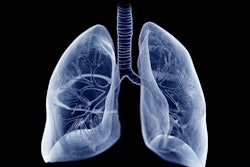Radiologists can help boost lung cancer screening (LCS) uptake by educating and supporting their primary care provider peers, according to a presentation delivered April 28 at the American Roentgen Ray Society (ARRS) meeting in San Diego.
"Radiologists are poised to lead efforts to improve LCS uptake among diverse stakeholders,[and] primary care providers play a crucial role in cancer prevention efforts," presenter Lauren Groner, DO, of Weill Cornell Medicine in New York City told session attendees.
LDCT is the gold standard for lung cancer screening, Groner said, noting also that current screening rates are about 16% among those eligible. Barriers at the provider, patient, and healthcare system levels perpetuate low screening rates. To address the issue, Groner and colleagues explored how radiologists might use a range of methods to identify and mitigate barriers to implementing guidelines for lung cancer screening, particularly developing a "multicomponent strategy to improve LCS uptake in [primary care] settings," she said.
The research had three phases: Identifying barriers primary care providers face regarding LCS, using behavioral and "implementation" science to design an LCS strategy, and refining and finalizing this strategy. The team conducted focus groups with primary care physicians regarding barriers that make it challenging to order LCS for their patients.
From the focus group, Groner's team generated a list of five key barriers to LCS:
- Insurance preauthorization
- Patients' cognitive and psychosocial states
- Provider-patient knowledge and communication
- The culture of a busy primary care practice
- Lack of patient follow-through on ordered exams
"[These] barriers affect providers' capability, opportunity, and motivation to screen patients for lung cancer," Groner told session attendees. "The most prominent barriers [correspond] to environmental context and resources, followed by beliefs about [LCS] consequences and knowledge."
The investigators then developed a set of strategies to boost LCS uptake, which included the following:
- Conduct educational meetings and training with primary care providers and clinic staff.
- Develop and distribute educational materials (for example, a website Groner's group developed called LungCheck.org).
- Develop an "implementation blueprint."
- Train LCS navigators.
- Modify the electronic health record system to embed a link to LungCheck.org, a best practice advisory for LCS, and optimized smoking history tracking.
The team's experiment with reaching out to primary care colleagues about LCS shows promise for boosting screening uptake, according to Groner.
"Our study provides a roadmap for using behavioral and implementation science to understand LCS barriers and design an evidence-based, theory-informed, multicomponent strategy to improve LCS uptake," she concluded.





















